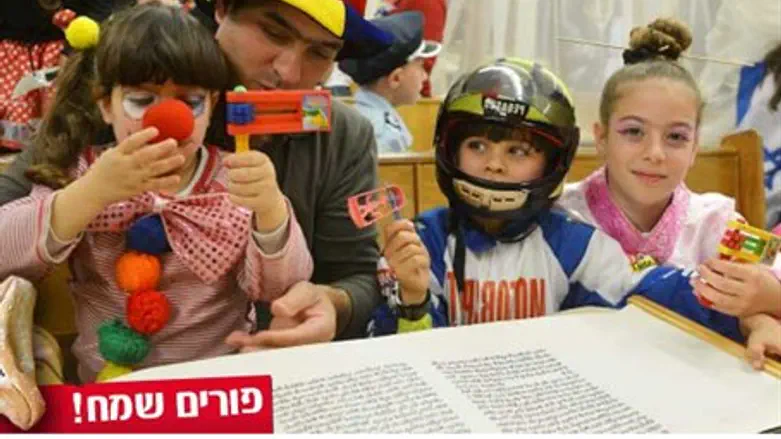
Thousands of people in Israel and around the world have begun their Purim celebrations Wednesday night, gathering in synagogues to hear the Purim story.
The most joyous day of the Jewish calendar, Purim (which most scholars agree took place during the 5th century BCE) is commemorated in a number of ways.
Those ways include the handing out of gifts, generous donations to charity, drinking until one can't distinguish between the hero Mordechai and the villain Haman (although many opinions make clear this means to drink more than usual, not to literally get drunk), and reading the Scroll of Esther (Megillat Esther in Hebrew), which tells the story of Purim and is named after the Jewish heroine and queen of Persia who helped turn Haman's genocidal plot on its head.
Not only were the Jews saved from tragedy, but they successfully fought back against their oppressors in every province of the empire.
One of the most well-known Purim traditions is the custom to wear costumes - a way of commemorating God's "hidden hand" in the seemingly unrelated chain of events which came together to foil Haman's plot and see him ultimately replaced by the Jews' leader, Mordechai.
Feasts featured prominently throughout the Purim story, including the feast whereby Nebuchadnezzer predicted his own downfall; King Achashveroshesh's grand display which saw his first queen, Vashti, killed by his own hands; the feasts Esther threw for Haman and the King, which saw the redemption of the Jewish people; and the small feasts held by the Jews and Persian commoners at Esther's behest after the anti-Semites were annihilated.
As such, two main customs were also started: one, a seuda (meal) to be held on Purim day (Thursday) with wine and meat; and to give gifts of mishloach manot, small meals, to friends and family.
Gifts to the poor will also be distributed nationwide, according to the commandment to ensure that even the poorest have food to eat on this festive holiday.
Purim is celebrated on Wednesday night and Thursday throughout most of Israel and abroad; in Jerusalem, it will be held Thursday night and Friday. Some communities remain under dispute as to their status, including Ramot and Lod, and may hold the holiday on both days.